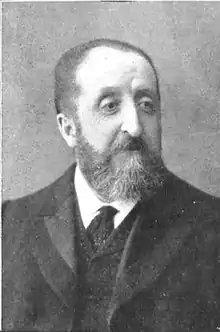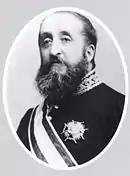Francisco Javier González de Castejón y Elío
Francisco Javier González de Castejón y Elío (25 May 1848 - 25 November 1919) was a Spanish lawyer and politician who served as Minister of Justice during the regency of Maria Christina of Austria, and served as Minister of Development and Minister of the Interior during the reign of Alfonso XIII. He also served as the Solicitor General of Spain.
Francisco Javier González de Castejón y Elío | |
|---|---|
 | |
| Minister of Justice | |
| In office 18 April 1900 – 6 March 1901 | |
| Preceded by | Luis María de la Torre y de la Hoz |
| Succeeded by | Julián García-San Miguel |
| In office 27 October 1913 – 7 September 1914 | |
| Preceded by | Pedro Rodríguez de la Borbolla |
| Succeeded by | Eduardo Dato |
| Minister of Development | |
| In office 6 December 1902 – 20 July 1903 | |
| Preceded by | Amós Salvador Rodrigáñez |
| Succeeded by | Rafael Gasset Chinchilla |
| In office 27 January 1905 – 23 July 1905 | |
| Preceded by | José de Cárdenas Uriarte |
| Succeeded by | Álvaro de Figueroa |
| Minister of the Interior | |
| In office 16 December 1904 – 27 January 1905 | |
| Preceded by | Manuel Allendesalazar y Muñoz de Salazar |
| Succeeded by | Augusto González Besada |
| Personal details | |
| Born | 25 May 1848 Pamplona, Spain |
| Died | 25 November 1919 Madrid, Spain |
| Political party | Catholic Union Conservative Party |
| Occupation | Lawyer, politician |
Biography

He was born on 25 May 1848 in Pamplona.[1] He was a professor of natural law at the Complutense University of Madrid. A member of the Catholic Union and the Conservative Party, he began his political career as a representative for Navarre in the 1879 elections, he was reelected several times until 1914, he resigned in 1915 and was appointed senator for life.[2]
He served as Minister of Justice between 18 April 1900 and 6 March 1901 during the premierships of Silvela and Azcarraga,[3] he served again between 27 October 1913 and 7 September 1914 during the premiership of Dato. He served as Minister of Development from 6 December 1902 to 20 July 1903 and from 27 January to 23 June 1905.[3] He was also Minister of the Interior from 16 December 1904 to 27 January 1905.[3]
He was a member of the Royal Academy of Jurisprudence and Legislation and of the Academy of Moral and Political Sciences.
Orders
- Knight Grand Cross of the Order of Isabella the Catholic.[4] (Kingdom of Spain)
- Knight Grand Cross of the Order of St. Gregory the Great.[4] (Holy See)
- Knight Grand Cross of the Order of Saint Michael.[4] (Kingdom of Bavaria)
References
- Vázquez de Prada Tiffé 1991, p. 469.
- "GONZÁLEZ DE CASTEJÓN Y ELÍO, FRANCISCO JAVIER. MARQUÉS DEL VADILLO". senado.es. 28 August 2020.
- Centro de Ciencias Humanas y Sociales (CCHS) del Consejo Superior de Investigaciones Científicas (CSIC) (ed.). "Ministros y miembros de organismos de gobierno. Regencias, Juntas de Gobierno, etc (1808-2000)". Archived from the original on 2018-10-05. Retrieved 2023-01-24.
- "Real decreto concediendo la Banda de la Real Orden de María Luisa a las Serenísimas Señoras Princesas Doña Dolores, Doña María de las Mercedes y Doña María de la Esperanza de Borbón y Orleáns" (PDF). Gaceta de Madrid. 17 March 1929.
Bibliography
- Vázquez de Prada Tiffé, Mercedes (1991). "El Marqués de Vadillo, figura clave del Partido Conservador en Navarra". Estudios de historia moderna y contemporánea: Homenaje a Federico Suárez Verdeguer. Madrid: Ediciones Rialp: 469–480. ISBN 84-321-2748-5. Archived from the original on 20 December 2016. Retrieved 29 July 2015.